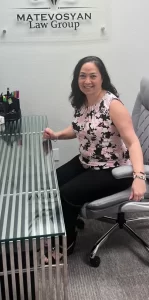Best Family Lawyer in Riverside County, CA
Lucy Matevosyan
Family Lawyer
Lucy Matevosyan is the founder of Matevosyan Law Group. She is dedicated to providing excellent service to her clients through compassion and understanding of her client’s needs. Her ultimate goal is to ensure client satisfaction throughout the case.
We provide a sophisticated range of services in Divorce and Family Law, including, but not limited to the following:
- Dissolution of Marriage
- Child Custody & Visitation
- Child Support
- Spousal Support
- Property Division
- Paternity
- Post-Judgment Modifications
Michael Perez
Family Lawyer
Michael Perez is an Associate Attorney with Envision Family Law. He previously worked as an Associate Attorney at a family law firm in Beverly Hills, where he assisted with domestic violence restraining orders, support matters, and dissolution cases with complex property distribution issues.
Michael received his B.A. in Communication Studies from UCLA and his Juris Doctorate from Loyola Law School, Los Angeles. During his time in law school, Michael served as a member of the Public Interest Law Foundation, a student-run organization invested in fostering the careers of students dedicated to assisting those traditionally underrepresented in the legal system. Michael also participated in the Street Law Teaching Practicum, wherein law students, under the direction of Judith Schwartz-Behar, esq. (attorney at the Harriett Buhai Center for Family Law), taught domestic violence survivors living in transitional facilities about landlord-tenant legal issues, the legal rights of employers and employees, financial literacy, protective orders and family law concepts.
In his free time, Michael enjoys spending time with his two dogs and taking frequent trips to Disneyland with his fiancé.
Vanessa D. Torres
Family Lawyer
Vanessa D. Torres is the principal of the Law Office of Vanessa D. Torres, P.A. and exclusively practices Insurance, Family/Matrimonial, Aviation, and Business law. An experienced litigator and negotiator, she represents small to mid size companies on all their general counsel needs, and families during some of the worst and best times in their lives.
Ms. Torres has substantial experience in federal and state court, arbitrations, mediations, and defending claims before agencies.
In addition to her litigation and negotiation experience, Ms. Torres provides clients with valuable day-to-day preventive counseling on compliance and avoiding lawsuits, offering in-house training programs on topics such as hiring/firing, sexual harassment, diversity, Family and Medical Leave Act, discrimination, and wage and hour compliance.
With respect to the aviation practice, Ms. Torres represents Maintenance, Repair, and Overhaul (MRO) facilities with operations in Miami and throughout the world. She handles all domestic and international transactions, regulatory compliance matters, and handle the day-to-day challenges regarding employment and labor law issues when serving in the role of General Counsel for the MRO facility. She also handles Defense of FAA enforcement actions and assists with voluntary disclosures.
Ms. Torres is an active member in the Florida Bar’s Aviation Law Committee, the Dade County Bar Association and a Board Member on the Miami-Dade Aircraft Noise Abatement Board representing District 6.
William P. Bratton, Esq.
Family Lawyer
Bar Admissions/Memberships:
- State Bar of California, Family Law Section, 1994 – Present
- Member
- State Bar of California, 1994 – Present
- Member
- Riverside County Bar Association, Family Law Section, 1994 – Present
- Prior Co-Chair
- Riverside County Bar Association, 1994 – Present
Educational Background:
- Western State University College of Law, Fullerton, California, 1994 J.D.
- Honors: With Scholastic Merit
- University of California, Riverside, California, 1982 B.A.
- Major: Administrative Studies
Shauna M. Albright
Family Lawyer
Shauna M. Albright is the Founding and Managing Partner of Albright Family Law Group. For the past 20 years, she and her team have helped thousands of clients navigate through divorce, child custody, support, property division and other aspects of Family Law. She prides herself in providing her clients that small firm attention with that big firm expertise.
Ms. Albright is the author of, “Child Custody & Visitation in California: Preparing for the Battle Ahead and Strategies for Winning the War.” She is also the host of the upcoming podcast, “The Divorce Cafe” which will launch in September 2022. In her podcast, Ms. Albright will offer legal guidance on divorce and child custody issues while tackling the raw emotions people experience when going through a divorce.
As a resident of Riverside County for over 35 years, Ms. Albright’s law firm prides itself in representing clients from Riverside County including the Temecula and Murrietta area as well as San Bernardino County. She is a board member of the Riverside Community College District Foundation since 2020 and a past president of the Richard T. Fields Bar Association Foundation. Both foundations are dedicated to raising monies for scholarships to assist students in their education. Shauna is proud to sponsor other community events over the years to help local youth and education programs.
E. Steve Najera
Family Lawyer
- ead counsel on all family law matters.
- Lead counsel on all criminal matters.
- Conduct professional research on the law, analyze the facts of each unique case, and prepare motions to file with the court and argue.
- Attend Continuing Legal Education to stay updated with recent changes in the law.
- Represent clients at Domestic Violence Restraining Order hearings.
- Represented clients in both misdemeanor and felony matters. Conducted professional research and analyzed and evaluated the facts to prepare a defense strategy.
- Trained legal interns, ensuring that all policies and procedures were fully followed.
- Represented parents in Dependency court, where I advocated to maintain parental rights intact and reunify families.
- Recognized with the distinguished Don Simm’s Trial Attorney of the Year award.
Mark Reel Jr.
Family Lawyer
Mark is the CEO and Managing Attorney at Reel Fathers Rights APC. He is licensed to practice law in California. Prior to founding Reel Fathers Rights APC, Mark spent more than a decade in the sports and fitness industries working as a scout, agent, event promoter, and operator, but pivoted back to family law after going through his own family court struggle.
Since founding Reel Fathers Rights, Mark has quickly developed the reputation nationally for his work and advocacy for fathers. He hosted a weekly live show for the Fathers Rights Movement previously called STATE of the FAMILY COURTS with Mark Reel Jr. He is also the author of the book, The Fathers Rights Playbook.
Locally he has developed a reputation as one of the most well-known and fierce advocates in Southern California. Working out of the Corona Office, Mark has represented men in Divorce, Child Custody, Child Support, and Domestic Violence matters throughout Southern California. He has appeared in courthouses throughout the state including courthouses in Riverside, Hemet, San Bernardino, Barstow, Orange, Vista, Pomona, Long Beach, Los Angeles, Chatsworth, Heyward and Modesto.
His practice focuses exclusively on Family Law, limited exclusively to Divorce, Child Custody, Child Support and Domestic Violence.
Mark is a father of 5-year old twins, Bryson and Bella.
You can listen to Mark on his weekly podcast, “The Fathers Rights Playbook” anywhere podcasts are available.
Stacy Albelais
Family Lawyer
I am attorney Stacy Albelais. I began working as a family law paralegal in 1998. I then went to law school and have been a practicing family law attorney since 2008. I have dedicated my practice to family law, providing exceptional service in a wide range of case levels from high-conflict, high-asset to amicable uncontested dissolutions and paternity matters.
Practice Areas:
- Family Law
- Child Support
- Custody & Visitation
- Divorce
- Domestic Violence & Neglect
- Adoptions & Guardianship Issues
- Property Distribution
- Restraining Orders
- Legal Separation
- Paternity
- Fathers’ Rights
- Prenuptial Agreements
- Same Sex Family Law
- Juvenile Dependency
- Grandparents Rights
- Spousal Support
Why Legal Documents Take Time to Process: A Guide to Understanding the Court System
Legal documents, whether related to civil matters like divorces or criminal cases, often take time to process. While this delay can be frustrating for those involved, there are several reasons why the court system operates at a slower pace than most people expect. This guide explains why legal documents take time to process and provides insight into the court system.
1. High Volume of Cases
One of the most significant factors contributing to delays in processing legal documents is the sheer volume of cases that courts handle daily. Courts often deal with a wide variety of cases, including criminal, civil, family, and administrative law matters. Each case involves its own set of documents that need to be processed, reviewed, and filed by the court staff. The larger the backlog, the longer it takes to process each individual case.
2. Multiple Steps in Processing
Legal document processing is not a simple, one-step procedure. It involves multiple stages, such as:
- Filing: Documents are initially submitted to the court, where they are checked for completeness and accuracy.
- Review by Court Clerks: Court clerks review the documents to ensure they meet legal standards, are filed correctly, and include the necessary information.
- Judge’s Review: In some cases, a judge must review the documents to make rulings or issue orders. Depending on the court’s caseload, this review may take time. Each of these stages can introduce delays if errors are found or additional information is needed.
3. Complexity of the Case
The complexity of a legal case also plays a role in how long it takes for documents to be processed. Simple cases, such as uncontested divorces or routine motions, may move more quickly through the system. However, more complex cases—like those involving multiple parties, disputes over large sums of money, or detailed legal arguments—require thorough review and scrutiny. These cases often necessitate longer wait times for document processing as they require more attention from court staff and judges.
4. Court Schedules and Availability
Judges and court staff have tight schedules. They must balance hearings, trials, and the review of legal documents. Courts are also bound by procedural rules and timelines that dictate when certain actions must occur. Additionally, judges may need to set aside time to carefully review certain documents, such as legal briefs, motions, or orders. Given these competing demands, legal documents may take time to be processed as judges prioritize urgent or time-sensitive cases.
5. Legal Deadlines and Notice Periods
Many legal actions involve specific deadlines and notice periods. For example, parties involved in a lawsuit must be given adequate time to respond to legal documents before the court can proceed. These deadlines, often ranging from weeks to months, are built into the legal system to ensure fairness. The necessity to meet these legal timeframes inevitably slows down the overall process.
6. Accuracy and Legal Compliance
Legal documents must comply with numerous rules and regulations. Whether it’s filing a motion, submitting a legal brief, or preparing a court order, there are strict guidelines that must be followed to ensure legal validity. These documents undergo rigorous reviews for accuracy, clarity, and adherence to court rules. If errors are discovered, such as incorrect information or missing signatures, the documents may need to be refiled, causing further delays.
7. Mediation and Negotiation Processes
In cases like divorces, personal injury claims, or business disputes, parties are often encouraged or required to pursue mediation or negotiation before going to trial. These processes can take time, as both parties attempt to reach an agreement outside of the courtroom. While mediation can ultimately save time by avoiding a lengthy trial, it can also add to the delay in processing final legal documents if settlement discussions drag on.
8. Holidays and Court Closures
Court systems operate according to their jurisdictions’ holiday schedules and may close during certain times of the year, such as national holidays or vacation periods. Additionally, courts may experience delays during busy periods, such as year-end. These closures or reduced operating times can slow down the document processing timeline.
9. Human Resources Limitations
Court systems are often limited by the availability of personnel, including clerks, judges, and administrative staff. With limited resources, it can take longer for documents to be filed, reviewed, and processed. Many courts have adopted electronic filing systems to improve efficiency, but even with technology, human oversight is still required to ensure everything is in order.
10. Appeals and Challenges
If one party in a legal case chooses to appeal a decision or challenge a ruling, it can significantly extend the processing time for legal documents. Appeals involve a separate court process, which means additional filings, reviews, and legal procedures. This process can prolong the final resolution of the case and the completion of the associated documentation.
Conclusion
Legal documents take time to process due to a combination of high case volumes, procedural requirements, case complexity, and limited court resources. While it may seem like an unnecessarily slow process, these delays help ensure that each case is handled fairly, accurately, and according to the law. Patience is crucial, and understanding the factors that contribute to these delays can help individuals navigate the legal system with more realistic expectations. Consulting with a lawyer can also provide insight into how long specific documents may take and what steps can be taken to expedite the process.











